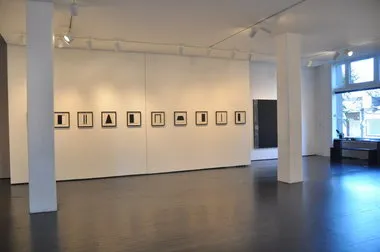
At last week's public symposium on abstraction at Reed College, San Francisco-based poet and art critic Bill Berkson, serving as one of the five panelists, remarked that "the myth of abstraction" is tangled up in a distinctly American understanding of freedom.
It's an astute observation, locating a cultural sense of autonomy or, perhaps more accurately, entitlement to the movement's emphasis on uninhibited expression. But his choice of the word "myth" pointedly girded his assertion with a second truth: Just as marginalized segments of the population enjoy meager access to "freedom," so, too, do many abstractionists traffic in ascetic restraint, governed by limitations and rules rather than free-wheeling brio.
Berkson's observation is especially pertinent to the current body of work by Portland-based artist Arnold J. Kemp, "Daydream Nation," which can be seen at PDX Contemporary Art this month.
The heart of the show is a series of 15 tightly controlled works on square pieces of Chinese paper. Using graphite and Flashe, Kemp's compositions are a balancing act of white and black geometric forms, which range from perfectly halved configurations ("Daydream Nation (1)," all works 2010) to more lopsided arrangements, in which either black or white occupies more or less space ("Daydream Nation (7)," for instance).
There's an obvious link to the Chinese concept of yin and yang, but there's also a subtle, almost elemental narrative embedded in the play of forms from piece to piece: Alternately, they appear equal, retreat from one another or encroach into the other's territory.
That is, these gentle and contemplative works relate a story of fluid and unresolved coexistence, an evolving struggle of difference to share the same space.
In his past work, Kemp, who serves as chairman of PNCA's MFA in Visual Studies program, has explored ideas of blackness as a means to understand and express his experience as an African American.
While this investigation is not readily visible in the "Daydream Nation" series -- apart from a lone, ravishingly black painting called "Tonight's Day" -- the content of his previous output inevitably steers interpretations of the current series toward commentary on race relations, specifically between blacks and whites.
Certainly, the degree of freedom enjoyed by these two groups has moved incrementally closer to legitimate equality in the past 50 years. But the exhibition's title, taken from the seminal 1988 album by the white art-rock band Sonic Youth, describes a country deluded by wistful fantasy.
Perhaps if freedom -- from prejudice, an appalling history of violent discrimination, and so on -- were equitably accessible for all Americans, the hard-edged lines and restricted geometries of Kemp's abstract forms would not feel so balefully concrete.
- John Motley
Arnold J. Kemp: "Daydream Nation"; PDX Contemporary Art, 925 N.W. Flanders St., 503-222-0063; 11 a.m. to 6 p.m. Tuesday to Saturday, through Nov. 27; free